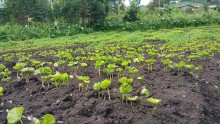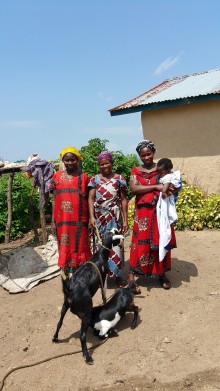Coffee Quality Manager Beth Ann Caspersen traveled to the Democratic Republic of the Congo to judge the country's first-ever coffee cupping competition. Here's part three of her updates from the field. Read part one here.
It was a bright and sunny morning, but the night rains made the roads from the center of Minova out to Bishange Primary Society muddy and more easily managed by a small motorcycle. So, I carefully climbed on the back and started our descent down into town to be greeted by children and adults shouting “Mzungu!” (white person), holding up their thumbs and smiling toward me.
My motorcycle driver and friend, Dunia Moises Muhindo, carefully maneuvered the muddy road. I don’t usually do this sort of thing - motorcycles make me extremely nervous - but I trusted Moises and I really wanted to go up to see the second coffee seedling nursery of the co-op. Fortunately the ride was short, a mere seven kilometers before we arrived to meet the two agronomists, Roger Myamulaa and Sifa Kahunga, for a steep climb up to the farms.
We were accompanied by a group of 15 men and women up the mountain and along the way we stopped at Nayanabo Kishwero’s plot to find many aging coffee trees. After a conversation about renovation and post-harvest preparation of the shamba, we continued our climb. The only way to Bishange is by foot, but recent work to start creating roads left the people I spoke to hopeful for transportation and easier trading. What I saw was increased potential for erosion and what was beginning to look like an already eroded area. Wide swaths of land were cleared and farmed without barriers, buffers or stepping. When I spoke with Pauline Sheke, the lead agronomist, about these issues he agreed with my observations but admitted that many of the people in the area are not part of the SOPACDI co-op, thus they were not receiving the training or education about erosion. It made me feel thankful for SOPACDI’s presence and sad for the people outside of the co-op who lacked such services. Perhaps the co-op members’ work will influence the other neighbors.

One of the benefits of being a woman coffee farmer and member of the SOPACDI co-op is a small premium of two cents per pound that is reserved for women’s group activities. I was able to see the results of this premium during my visit six months ago when I met the first recipients of a goat project.

I wondered what the impetus has been for increased inclusion of women in a country that has historically been male dominated and wrought with sexual violence. What has changed? And when I asked, one of the women said, “I am so grateful and happy.” I learned that the co-op had played a key role in including women since 2011, and while owning land is complex due to cultural and ethnic history, women culturally own the land and are full members of the co-op alongside their husbands.
They farm their own plots and control the income. The cultural and economic shift is notable, however, women still perform the majority of household tasks as well. I thought about this in the context of attending meetings and participating in the co-op. It was then that I asked the group what it meant to them to be a member of the co-op and this is what they told me: in order to be a member, one must have a coffee garden, pay a one-time social contribution of $10, supply coffee to the cooperative, and attend trainings and meetings. This is what all members, regardless of gender, are expected to do.
While cultural ownership of land within the co-op structure does not address deeper land ownership laws in the DRC, it is clear to me that the members of SOPACDI are making their own path forward in the best way they can manage. At Bishange there are 678 members, of which 207 are women.
The women believe that they have a voice now, but as is the case in many coffee communities, they still struggle; farming is hard work. They asked me if Equal Exchange could help buy them tools for farming. I contemplated their request, which I receive from farmer partners frequently, and said I would think about it, but made no promises. This was the first time I had ever met these women and there they were sharing intimate pieces of their life with me, but as in any relationship, you have to get to know each other. As they say in DRC, “pole, pole,” which translates to “slowly, slowly.”
Sitting together, sharing stories over a cup of fermented cow’s milk, I told them about my family and Equal Exchange. The owner of the home told me, “We are happy to receive a mother,” which of course made me a bit teary eyed and proud.
Pole, pole.
